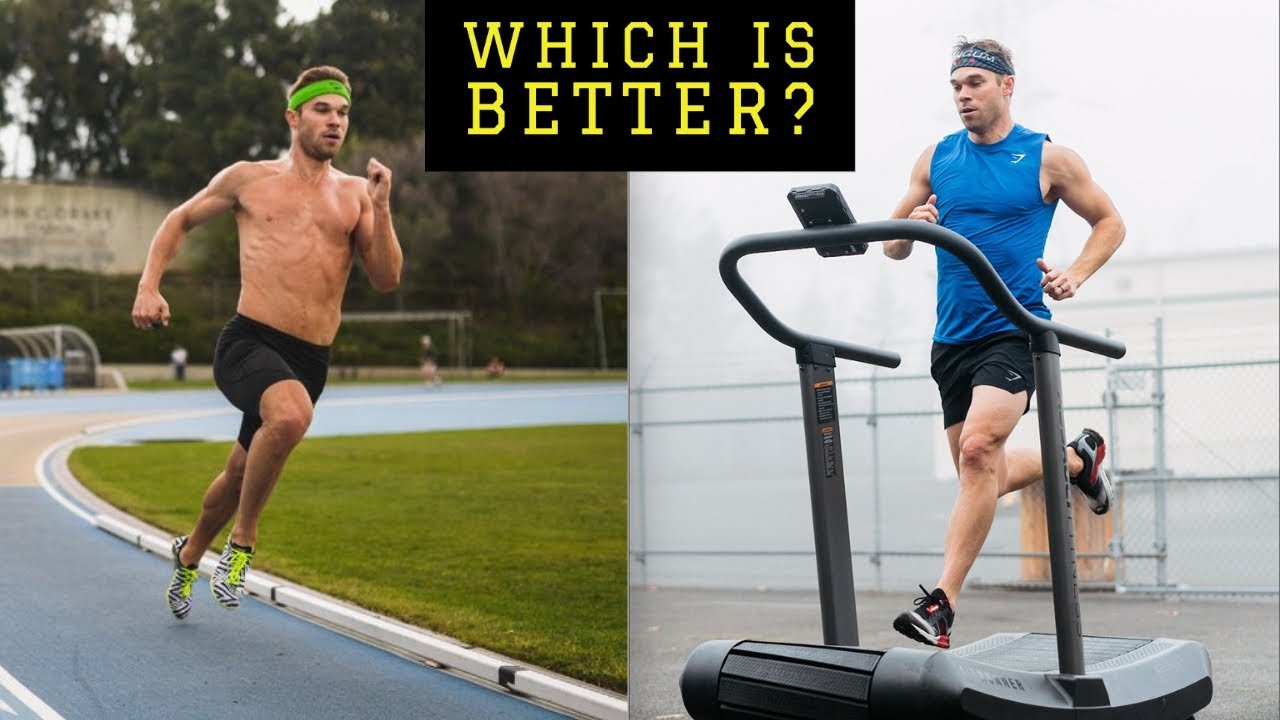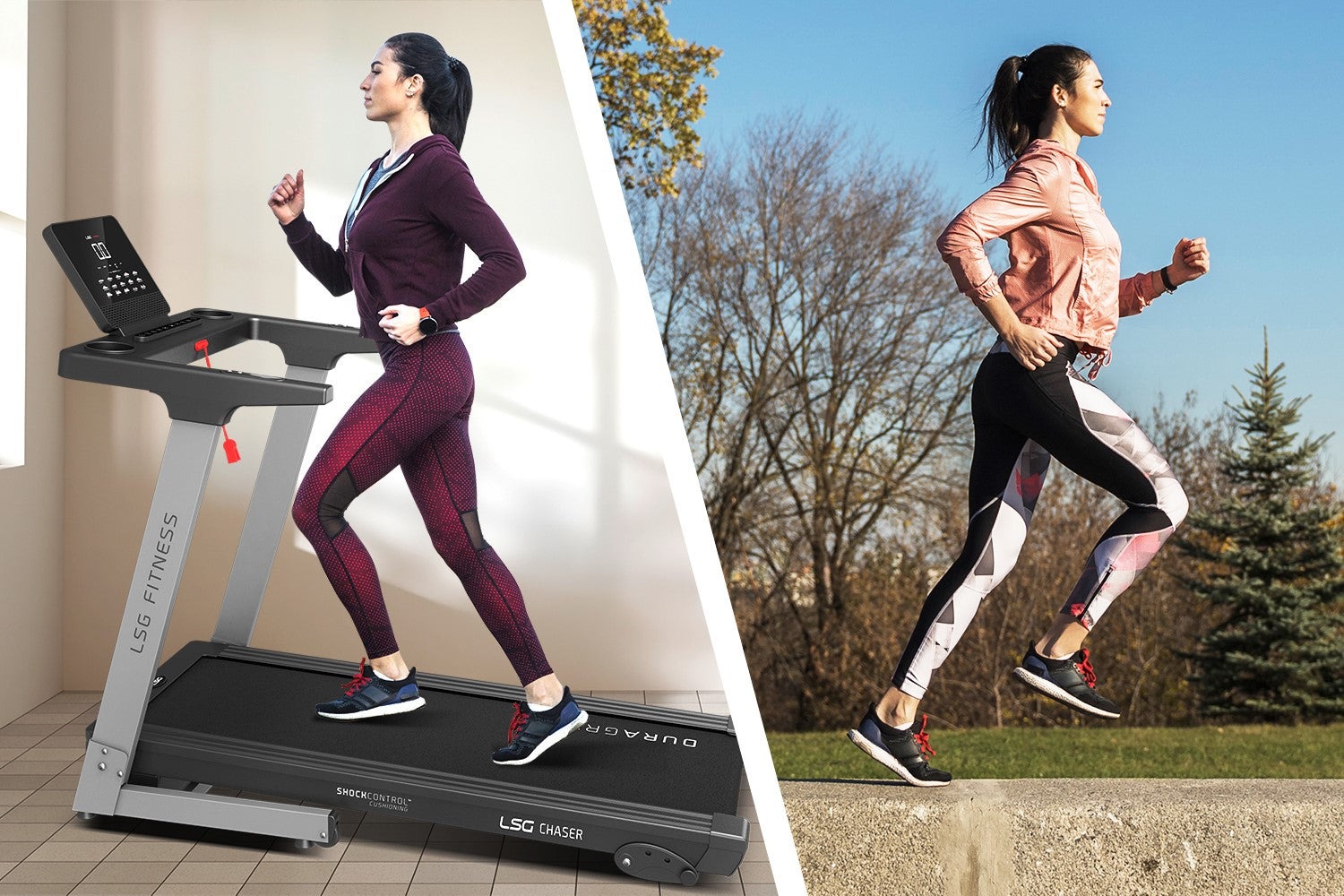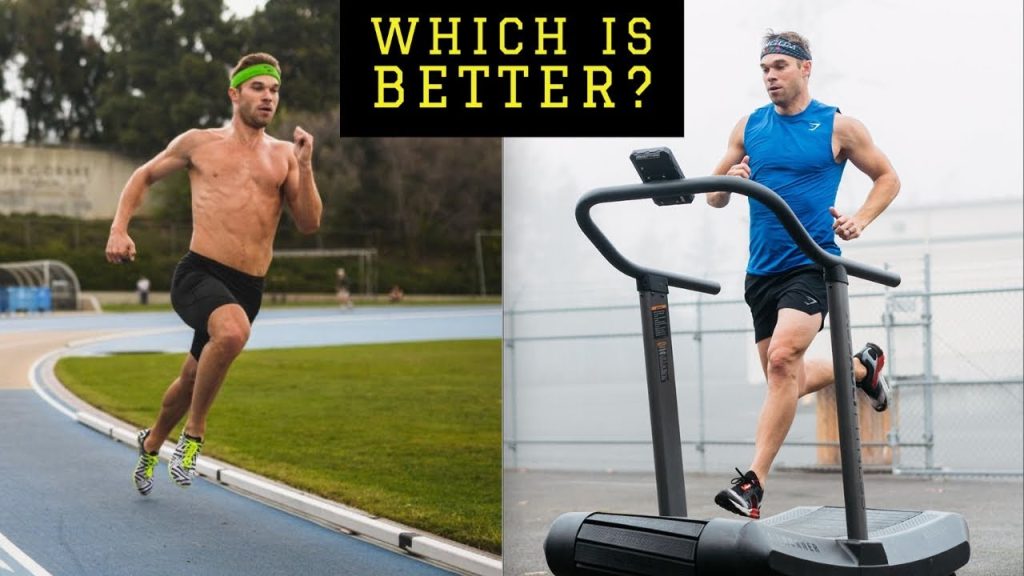The debate between treadmill and outdoor running has divided runners for decades. Whether you’re a beginner choosing your first running routine or an experienced runner optimizing your training, understanding the distinct advantages and limitations of each approach is crucial for making the right decision for your goals, lifestyle, and circumstances.
The reality: Both treadmill and outdoor running offer unique benefits, and the “best” option depends on your specific needs, preferences, and situation. Research shows that optimal runners often incorporate both modalities strategically rather than choosing one exclusively.
This comprehensive guide will analyze every aspect of treadmill versus outdoor running, providing you with the scientific evidence and practical insights needed to make informed decisions about your running routine.

The Science: Physiological Differences Between Treadmill and Outdoor Running
Energy Expenditure and Metabolic Demands
Outdoor Running Energy Requirements:
- 5-10% higher calorie burn due to wind resistance and terrain variations
- Air resistance increases exponentially with speed (minimal at slow paces, significant above 6 mph)
- Terrain changes require constant muscle adaptation and increased stabilization
Treadmill Running Compensation:
- 1% incline compensates for lack of air resistance at most running speeds
- Consistent surface reduces stabilization energy demands
- Climate control eliminates thermal regulation energy costs
Research Findings: A landmark study published in the Journal of Sports Medicine found that running at 1% treadmill incline produces nearly identical VO2 consumption to outdoor running at the same pace, validating the compensation strategy.

Biomechanical Analysis
Gait Pattern Differences:
Treadmill Running Characteristics:
- Slightly shorter stride length (2-3% reduction)
- Increased cadence to maintain pace
- Reduced ground contact time due to moving belt assistance
- Consistent foot strike pattern due to uniform surface
Outdoor Running Characteristics:
- Natural stride variability adapting to terrain changes
- Enhanced proprioception from surface variations
- Improved balance and stability from navigating obstacles
- Stronger stabilizing muscles from uneven surfaces
Cardiovascular and Respiratory Responses
Heart Rate Patterns:
- Outdoor running: More variable heart rate due to terrain and weather
- Treadmill running: More consistent heart rate zones for controlled training
- Perceived exertion: Often 5-10% higher on treadmill at same pace due to lack of air movement and visual stimulation
Oxygen Consumption:
- Outdoor: Variable based on wind, hills, and temperature
- Treadmill: Consistent and predictable for precise training zones
- Training adaptation: Both modalities produce similar cardiovascular improvements
Comprehensive Comparison: Treadmill vs Outdoor Running
Performance and Training Benefits
| Aspect | Treadmill Running | Outdoor Running | Winner |
|---|---|---|---|
| Pace Control | Precise, consistent pacing | Variable, requires discipline | Treadmill |
| Hill Training | Precise incline control | Natural, varied terrain | Tie |
| Speed Work | Exact intervals possible | GPS-dependent accuracy | Treadmill |
| Endurance Building | Consistent effort zones | Natural pace variations | Tie |
| Mental Toughness | Limited challenge | Weather, terrain challenges | Outdoor |
| Race Preparation | Limited conditions | Real race conditions | Outdoor |
Safety and Injury Prevention
Treadmill Safety Advantages:
- Controlled environment eliminates weather-related hazards
- Even surface reduces ankle sprain risk
- Emergency stop capability for immediate workout cessation
- Cushioned deck provides consistent shock absorption
- No traffic or personal safety concerns
Treadmill Injury Risks:
- Overuse injuries from repetitive motion on identical surface
- Achilles tendon stress from slight heel elevation
- Falls from belt movement (rare but serious when they occur)
- Muscle imbalances from lack of lateral movement
Outdoor Safety Advantages:
- Natural movement patterns reduce overuse injury risk
- Varied surfaces strengthen stabilizing muscles
- Enhanced proprioception improves injury prevention
- Full-body engagement from terrain navigation

Outdoor Safety Risks:
- Traffic hazards and collision risks
- Uneven surfaces increasing fall and sprain risk
- Weather-related dangers (heat, cold, storms)
- Personal safety concerns in certain areas or times
Mental and Psychological Benefits
Treadmill Mental Advantages:
- Distraction-friendly environment for entertainment consumption
- Precise progress tracking with immediate feedback
- Controlled conditions reduce anxiety about weather or safety
- Consistent routine appeals to structure-preferring personalities
Treadmill Mental Challenges:
- Monotony and boredom from unchanging environment
- “Hamster wheel” psychology can reduce motivation
- Artificial environment lacks natural stimulation
- Time perception often feels slower indoors
Outdoor Mental Advantages:
- Natural mood enhancement from sunlight and fresh air exposure
- Vitamin D synthesis from sun exposure
- Constantly changing scenery provides mental stimulation
- Connection with nature reduces stress and improves well-being
- Seasonal variety keeps running experience fresh
Research on Mental Health: Studies consistently show that outdoor exercise produces greater improvements in mood, self-esteem, and stress reduction compared to indoor exercise, attributed to the “green exercise” effect.
Weather and Seasonal Considerations
Climate-Controlled Training Benefits
Treadmill Weather Independence:
- Consistent training regardless of external conditions
- No weather-related workout cancellations
- Optimal temperature for performance (65-70°F)
- Controlled humidity prevents overheating
- No seasonal gear requirements
Outdoor Weather Adaptation
Seasonal Training Variety:
- Heat acclimatization improves warm weather race performance
- Cold weather training builds mental toughness
- Wind training enhances overall strength and stability
- Altitude benefits from varied elevation running
Weather-Specific Strategies:
Hot Weather Outdoor Running:
- Early morning or evening timing for cooler temperatures
- Increased hydration requirements
- Electrolyte replacement becomes critical
- Pace adjustment necessary for temperature
Cold Weather Outdoor Running:
- Layering systems for temperature regulation
- Extended warm-up requirements
- Visibility gear for shorter daylight hours
- Footwear traction for icy conditions
Training Specificity: Matching Your Goals
Race Preparation Considerations
For Road Race Training:
- Outdoor running provides race-specific conditions
- Weather adaptation crucial for race day success
- Pacing skills developed through GPS-free running
- Mental preparation for race day challenges
For Time Trials and Tempo Work:
- Treadmill precision enables exact pace training
- Controlled conditions eliminate variables
- Progressive workouts with precise incline changes
- Consistent effort measurement
Training Phase Applications
Base Building Phase:
- Both modalities effective for aerobic development
- Outdoor preferred for variety and enjoyment
- Treadmill useful for consistent easy pace
Speed Development Phase:
- Treadmill advantageous for precise interval work
- Track or outdoor hills for race-specific speed
- Combined approach optimizes different speed qualities
Taper Phase:
- Treadmill beneficial for controlled, easy running
- Outdoor preferred for race simulation
- Personal preference should guide decision
Equipment and Cost Analysis
Treadmill Investment Considerations
Quality Treadmill Costs:
- Budget models: $500-$1,500 (basic features, limited durability)
- Mid-range: $1,500-$3,000 (better motors, more programs)
- Commercial quality: $3,000-$8,000+ (gym-grade durability)
Additional Treadmill Costs:
- Maintenance: $200-$500 annually for belt replacement and servicing
- Electricity: $150-$300 annually depending on usage
- Space requirements: 6×3 feet minimum footprint
Treadmill Features to Consider:
- Motor horsepower: 2.5+ HP for regular use
- Belt dimensions: Minimum 20″ wide, 55″ long for comfort
- Cushioning system: Reduces impact stress
- Incline range: 0-15% for training variety
- Console features: Heart rate monitoring, preset programs
Outdoor Running Investment
Essential Outdoor Gear:
- Quality running shoes: $120-$200+ (replace every 300-500 miles)
- Weather-appropriate clothing: $200-$500 for complete wardrobe
- Safety accessories: $50-$150 (lights, reflective gear, GPS watch)
- Seasonal gear: $100-$300 (cold weather, rain protection)
Ongoing Outdoor Costs:
- Shoe replacement: $240-$400 annually for high-mileage runners
- Clothing replacement: $100-$200 annually
- Race entries: $25-$150 per race (optional but motivating)
For detailed reviews of running shoes suitable for both treadmill and outdoor training, including durability comparisons and surface-specific recommendations, visit shoeexpert.net. Their experts provide comprehensive analysis of footwear performance across different running environments.
Optimal Strategies: Combining Both Approaches
The Hybrid Training Model
80/20 Distribution Strategies:
Outdoor-Focused Approach (80% outdoor):
- Best for: Race preparation, experienced runners, mental health benefits
- Outdoor use: Long runs, easy runs, tempo runs, hill training
- Treadmill use: Precise speed work, bad weather backup, recovery runs
Treadmill-Focused Approach (80% treadmill):
- Best for: Beginners, urban dwellers, safety concerns, precise training
- Treadmill use: Daily training, speed work, long runs, base building
- Outdoor use: Weekend long runs, race simulation, mental variety
Seasonal Integration Strategies
Spring/Summer Emphasis:
- Increase outdoor percentage to 70-80%
- Utilize extended daylight for after-work outdoor runs
- Build heat tolerance for summer races
- Enjoy optimal weather conditions
Fall/Winter Emphasis:
- Increase treadmill percentage to 60-70% as needed
- Maintain consistency despite weather challenges
- Use treadmill for structured workouts
- Outdoor runs when conditions permit
Weekly Schedule Integration
Sample Hybrid Training Week:
- Monday: Treadmill easy run (precise pace control)
- Tuesday: Outdoor tempo run (race-specific conditions)
- Wednesday: Treadmill intervals (exact speed control)
- Thursday: Outdoor easy run (mental recovery)
- Friday: Rest or treadmill easy run
- Saturday: Outdoor long run (endurance and enjoyment)
- Sunday: Rest or outdoor easy run
Special Population Considerations
Beginner Runner Recommendations
Advantages of Starting with Treadmill:
- Consistent pacing prevents overexertion
- Safety and confidence building in controlled environment
- Immediate feedback on pace and distance
- Weather independence maintains consistency
Transitioning to Outdoor Running:
- Week 1-2: 50/50 split to compare experiences
- Week 3-4: Gradually increase outdoor percentage
- Month 2+: Develop preference based on goals and enjoyment
Age-Specific Considerations
Older Adults (50+ years):
- Treadmill benefits: Reduced fall risk, climate control, emergency stop
- Outdoor benefits: Vitamin D, varied stimulation, social opportunities
- Recommendation: Prioritize safety while maintaining outdoor exposure
Youth and Adolescents:
- Outdoor preferred for natural movement development
- Treadmill supplementation for structured training
- Emphasis on enjoyment over performance optimization
Injury Recovery Applications
Treadmill Advantages for Rehabilitation:
- Precise speed control for gradual progression
- Consistent surface eliminates impact variables
- Emergency stop capability for immediate cessation
- Handrail support during initial return phases
Outdoor Benefits for Recovery:
- Natural movement patterns promote balanced healing
- Mental health benefits support overall recovery
- Gradual surface variation rebuilds proprioception
- Social support opportunities during group runs
Technology Integration and Tracking
Treadmill Technology Advantages
Built-in Monitoring:
- Real-time feedback: Instant pace, distance, incline data
- Heart rate integration: Chest strap and grip sensors
- Preset programs: Structured workouts and challenges
- Entertainment integration: Built-in screens, app connectivity
Advanced Treadmill Features:
- Interactive training: Virtual courses and coaching
- Social connectivity: Online challenges and leaderboards
- Biomechanical analysis: Some models offer gait analysis
- Environmental simulation: Fans, elevation changes
Outdoor Technology Solutions
GPS Watch Integration:
- Accurate tracking: Distance, pace, elevation, route mapping
- Training analysis: Advanced metrics and performance trends
- Navigation: Route guidance and safety features
- Social features: Activity sharing and challenges
Smartphone Applications:
- Route planning: Discover new paths and measure distances
- Safety features: Emergency contacts and location sharing
- Audio coaching: Guided workouts and motivation
- Music and podcasts: Entertainment during longer runs
Environmental Impact and Sustainability
Energy Consumption Analysis
Treadmill Environmental Costs:
- Electricity usage: 600-900 watts per hour of operation
- Manufacturing impact: Significant resource requirements
- Maintenance materials: Belts, lubricants, replacement parts
- End-of-life disposal: Electronic waste considerations
Outdoor Running Environmental Benefits:
- Zero energy consumption during activity
- Minimal equipment requirements reduce manufacturing impact
- Connection with nature promotes environmental awareness
- Sustainable transportation when running to destinations
Carbon Footprint Considerations
Lifetime Impact Analysis:
- Treadmill: Higher upfront environmental cost, ongoing energy use
- Outdoor: Lower direct impact, potential travel costs to running locations
- Optimal approach: Strategic use of both modalities minimizes overall impact
Making Your Decision: Personal Assessment Framework
Goal-Based Decision Matrix
Weight Loss and Fitness Goals:
- Both equally effective for calorie burning and cardiovascular health
- Consistency factor more important than modality choice
- Treadmill advantage: Weather-independent consistency
- Outdoor advantage: Higher calorie burn from terrain variety
Performance and Racing Goals:
- Race-specific training requires outdoor experience
- Precise speed development benefits from treadmill control
- Mental preparation requires outdoor challenge exposure
- Optimal approach: Strategic combination based on training phase
Mental Health and Enjoyment:
- Nature connection strongly favors outdoor running
- Consistency and routine may favor treadmill for some personalities
- Social opportunities generally better outdoors
- Personal preference should heavily influence decision
Practical Lifestyle Factors
Time Availability:
- Treadmill: Immediate access, no travel time
- Outdoor: Potential travel to safe/scenic routes
- Consideration: Factor total time investment, not just running time
Safety Concerns:
- Personal safety: Treadmill advantage in unsafe areas
- Injury concerns: Outdoor running provides better proprioception training
- Weather safety: Treadmill eliminates climate-related risks
Space and Budget:
- Treadmill: Significant upfront cost and space requirements
- Outdoor: Lower entry cost, minimal storage needs
- Long-term costs: Consider maintenance, electricity, and equipment replacement
Maximizing Benefits from Your Chosen Approach
Optimizing Treadmill Training
Combating Boredom:
- Entertainment variety: Rotate between music, podcasts, videos, and books
- Workout diversity: Change speeds, inclines, and interval patterns regularly
- Virtual training: Use apps that simulate outdoor courses and competitions
- Social connection: Join online treadmill communities and challenges
Improving Safety:
- Proper setup: Ensure adequate space around treadmill
- Safety key usage: Always use emergency stop clip
- Maintenance: Regular belt lubrication and tension checking
- Hydration accessibility: Keep water bottle within easy reach
Enhancing Effectiveness:
- 1% minimum incline to simulate outdoor conditions
- Varied workouts: Include hills, intervals, and tempo runs
- Form focus: Use mirrors or video to monitor running mechanics
- Progressive overload: Gradually increase speed, incline, or duration
Optimizing Outdoor Training
Route Planning:
- Safety assessment: Choose well-lit, populated areas during appropriate times
- Surface variety: Include different terrains for comprehensive muscle development
- Distance measurement: Use GPS devices or pre-measured routes
- Weather monitoring: Plan routes appropriate for conditions
Safety Protocols:
- Visibility gear: Reflective clothing and lights for dawn/dusk running
- Communication plan: Inform others of route and expected return
- Emergency preparedness: Carry ID, phone, and emergency contacts
- Situational awareness: Stay alert to surroundings and potential hazards
Performance Optimization:
- Pacing discipline: Use GPS watch or internal pacing skills
- Terrain utilization: Incorporate hills, trails, and varied surfaces strategically
- Weather adaptation: Adjust pace and hydration for conditions
- Recovery considerations: Choose softer surfaces for easy days
Common Mistakes and How to Avoid Them
Treadmill Training Mistakes
The “Treadmill Dependence” Trap:
- Problem: Over-reliance on treadmill creates outdoor running difficulties
- Solution: Include regular outdoor runs even if treadmill is primary mode
- Prevention: Maintain 20-30% outdoor running minimum
Ignoring Incline:
- Problem: Flat treadmill running doesn’t replicate outdoor conditions
- Solution: Use minimum 1% incline for all treadmill runs
- Advanced: Incorporate hill training with varied inclines
Pace Over-Dependence:
- Problem: Inability to pace without treadmill speed display
- Solution: Cover display occasionally and run by effort
- Development: Practice pacing skills during outdoor runs
Outdoor Running Mistakes
Weather Stubbornness:
- Problem: Insisting on outdoor running in dangerous conditions
- Solution: Develop treadmill backup plan for extreme weather
- Balance: Prioritize safety over consistency preferences
Route Monotony:
- Problem: Running same route repeatedly reduces mental stimulation
- Solution: Explore new routes regularly and vary direction
- Planning: Use route-planning apps to discover new paths
Pacing Inconsistency:
- Problem: Inconsistent effort levels due to terrain and conditions
- Solution: Learn to run by effort rather than pace alone
- Tools: Use heart rate monitoring for effort-based training
For comprehensive guidance on running shoes suitable for both treadmill and outdoor training, including surface-specific recommendations and durability analysis, shoeexpert.net provides expert reviews and fitting advice to optimize your running experience regardless of your chosen training environment.
Frequently Asked Questions
Q: Is treadmill running easier than outdoor running? A: At 0% incline, yes. Treadmill running burns 5-10% fewer calories due to lack of air resistance and moving belt assistance. Setting the treadmill to 1% incline equalizes the effort.
Q: Can I train for a marathon exclusively on a treadmill? A: While possible, it’s not recommended. Marathon training benefits significantly from outdoor running experience, including weather adaptation, pacing skills, and mental preparation for race conditions.
Q: Does treadmill running cause more injuries than outdoor running? A: Different injury patterns emerge. Treadmills may increase overuse injuries from repetitive motion, while outdoor running has higher acute injury risk from falls and uneven surfaces.
Q: Should I buy a treadmill or join a gym? A: Consider usage frequency, space, and long-term costs. Home treadmills offer convenience but require maintenance. Gym memberships provide equipment variety but involve travel time and monthly fees.
Q: How do I make treadmill running less boring? A: Vary workouts with intervals and inclines, use entertainment (music, podcasts, videos), try virtual running apps, or join online treadmill communities for motivation.
Q: Is outdoor running better for weight loss? A: Outdoor running typically burns 5-10% more calories, but the difference is minimal. Consistency and total exercise volume matter more than modality for weight loss success.
Q: Can I get the same fitness benefits from treadmill running? A: Yes, when adjusted for intensity. Both modalities provide excellent cardiovascular and muscular benefits when performed consistently at appropriate effort levels.
Conclusion
The treadmill versus outdoor running debate isn’t about finding a universal winner—it’s about identifying what works best for your unique situation, goals, and preferences. Both modalities offer distinct advantages and can contribute significantly to your running success and overall health.
Key decision factors:
- Training goals: Race preparation favors outdoor running; precise speed work favors treadmill
- Safety concerns: Personal security and weather hazards may dictate choice
- Consistency needs: Weather independence of treadmills supports year-round training
- Mental preferences: Nature connection versus controlled environment comfort
- Budget considerations: Upfront treadmill costs versus ongoing outdoor gear expenses
The optimal approach for most runners: Strategic integration of both modalities based on training phases, weather conditions, and specific workout objectives. This hybrid approach maximizes the unique benefits of each while minimizing their respective limitations.
Whether you choose the precision and convenience of treadmill training, the variety and natural benefits of outdoor running, or a strategic combination of both, the most important factor is consistency. The best running routine is the one you’ll stick with long-term.
Ready to optimize your running routine? Start by honestly assessing your goals, constraints, and preferences. Then experiment with different approaches to find your ideal balance. Remember that your needs may change with seasons, life circumstances, and evolving fitness goals.
For expert guidance on running shoes optimized for your chosen training environment, detailed gear reviews, and surface-specific recommendations, visit shoeexpert.net – your trusted resource for making informed running equipment decisions.


